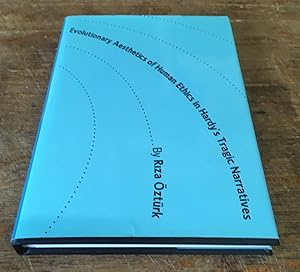Synopsis:
Treatment of Hardy's tragic narratives under the objective lens of evolutionary literary theory has led to three basic findings: First, within the scope of the analysis of the five major tragic narratives, representation of Hardy's evolutionary aesthetics of human ethics, in terms of altruistic sympathy and compassion, shows that adapted parental investment in children indicates the reason why women submit to pain and suffering more than the men do. The costly investment of women in maternal behaviour leads to submission in many cases, but in return they gain better fitness for survival and reproduction than men. This is implicitly highlighted as a force of superiority in the tragedies studied, as the male characters often invest in heroic deeds over their children. Second, that which has for many years been identified as pessimism in Hardy's tragic narratives is in fact a surface cognitive layer, under which is an implicit teaching of evolutionary aesthetics of human ethics, which guides to a true fitness of human life. Third, sympathy and particularly compassion are not only human emotions but also adapted cognitive virtues that centre on ethical teaching. Thus, an integrated model of science and humanities for art and literary analysis is required to address not only those of English language and literature departments, but also those aligned to the idea of integrating the two methods. A scientific and objective view of human life is in opposition to postmodern and structuralist approaches, which have generally been considered as the centre of interest during the latter half of the 20th century.
Review:
"Professor Riza OEzturk's new book, Evolutionary Aesthetics of Human Ethics in Hardy's Tragic Narratives, represents the cutting-edge thinking about narratives in terms of evolutionary science. The book reflects the best knowledge in this area (e.g., Paul Ekman, Leda Cosmides and John Tooby) as well as the best thinking on literary Darwinism (e.g., Joseph Carroll). In a well-written and well-organized book, OEzturk carefully delineates how aesthetics interacts with chance and selection in the work of Thomas Hardy, who embodies tragic figures with altruistic behavior to render reader response. OEzturk skillfully outlines how (evolved) emotions influence intention, attention, and consciousness; emotions are adapted functions designed to deliver aesthetic response (which means that art is not necessarily a human byproduct but is a necessary, evolved need). Stories (in both the telling and listening) are cognitive adaptations driven by aesthetics (and with significance for ordinary life). From aesthetics come ethics. Aesthetics is part of the process of selection so that triggered behaviors are put into play; such behaviors indicate fitness. Furthermore, OEzturk demonstrates, Hardy epitomizes how total ecological forces tap into basic (adapted) human emotions: Hardy's natural world embodies evolutionary fitness to evince adapted behaviors in society and culture. For Hardy, nature is a complex web of real and cognitive inter-weavings: that is, selection (competition to attract a sexual partner) operates on (and within) individuals. OEzturk concludes that we find two categories of characters in Hardy: outsiders whose selfishness limits control; those who strive for fitness (even if failure is inevitable). While there is suffering in Hardy's novels, such pain and grief exist to illustrate altruistic fitness - sympathy and compassion. Thomas Hardy does not create this suffering (it is in nature - or in society), which serves to reveal (or not) an individual's adaptability (or not). Thus, OEzturk explains, Hardy helps make readers sympathetic to characters; he is hopeful regarding his characters and demonstrates how to be humane in extraordinarily difficult circumstances. Because we feel sympathy and compassion we are not, then, vulnerable but active, and such an emotional state prepares readers for survival (and reproduction). For Hardy, the facts of life help us develop (seen through OEzturk's evolutionary approach) ethical sensibilities. As Joseph Carroll has remarked, the linguistic and textual poststructuralist readings of the 1970s and 1980s have yielded, ultimately, unsatisfactory results. Now, along with names such as Carroll's, Riza OEzturk will rank among the top scholars of this important, robust meeting of the sciences and humanities."-Gregory F. Tague, PhD, Professor of English, St. Francis College, New York, USA; Author of Character and Consciousness (2005) and Ethos and Behavior (2008)
"About this title" may belong to another edition of this title.
![]()

